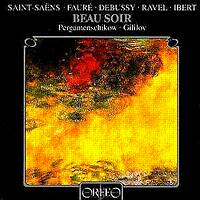|
<< -- 4 -- Tess Crebbin FUNDAMENTAL SPIRIT

The final recording of the Pergamenschikow/Gililov partnership took place between 1 and 3 March 1994 at the Studio Kraus in Walchstadt, also for Orfeo but this time as an actual co-production with the Bayerischer Rundfunk that had become very enthusiastic about the two Russians and had elevated them to its new chamber music stars, generous airplay and all included. The CD was released in 1995 and showcases the turn-of-the-century French composers, providing snippets of their work. Included are works by Saint-Saëns (1835-1921), Debussy (1862-1918), Ibert (1890-1962) and Fauré (1845-1924). We meet again, on this CD, Ravel's Piece en forme de Habanera, which we know from the Aulos CD of the duo's 1985 recording. This time, it has a fraternal touch, yet at second glance, or rather listen, the brisk action carries forth a covertly tragic undertone, provided by the gifted cellist whose health had by that time already started to collapse. His passionate determination to hang on to life in order to continue producing exceptional music can be heard through his playing. This is why it is always good to have recordings of the same work, by the same artist, to compare different time periods. The cello, especially, is an instrument that reflects its player's mindset in its sound, and so it is very interesting, especially in these recordings made over a period of nine years, to see this principle at work. Pergamenschikow's cello has come a long way since 1985, sounding always exceptional but expressing a whole range of tonal splendour: glittering, sparkling, intense or lustrous at times, then playful at others, or flaring with determination just to be alive, sometimes with fraternal yielding, at other times broken-hearted, then speckled with joy. It is a sympathetic, benevolent cello that Pergamenschikow gives us at all times, never bullying, nor sounding run-down or feeble, and certainly never given to violence or anger. Throughout the years of his partnership with Gililov, Pergamenschikow nurtured his cello to keep its sound fresh and invigorating, and the offspring of all these years of hard work is this final Orfeo CD that may be well among their best. Saint-Saëns' Allegro appassionato Op 45
[listen -- C 349 951 A track 1, 2:25-3:51]
thus far exhibits the best cello performance of all the recordings of the same work, by other artists, that I have heard. However, the piano is somewhat excitable, as seems to be in Gililov's nature, and in the second Saint-Saëns' track, Le Cygne, it gallops off like an excited horse at times. This may have been done on purpose by the pianist wishing to convey the excitement of highly-strung animals at Le Carnaval des animaux.

It is unfortunate that, without giving much explanation to their public, the duo chose to call their recording time together quits after this CD had been made. Gililov then went on to partner several other cellists, such as Maisky, while Pergamenschikow teamed up with Lars Vogt for chamber music. This teamwork with Vogt was also very successful and will win him, posthumously, the 2004 Echo Classical Award for Best Chamber Music.
'Playing with a French bridge as he did,' explains the German cello maker Wolfgang Schnabl who, at the cellist's request, had built a copy of Pergamenschikow's 1735 Montagnana cello and knew the Russian's style well, 'Pergamenschikow exhibits admirable cello playing, especially when paired with someone like Gililov who, being a concert pianist, produces a very vivid piano sound. The difference is that cellists playing with Belgian bridges can hear themselves louder and their sound travels further through the brightness that this type of bridge produces, whereas to Pergamenschikow, tone color and quality of sound was more important than quantity, ie loudness. When playing with another instrument or instruments, many cellists tend to ask: "did you hear me" (liking to hear themselves loudly), whereas Pergamenschikow would ask: "doesn't the beautiful sound of the Montagnana thrill you?"'
|

